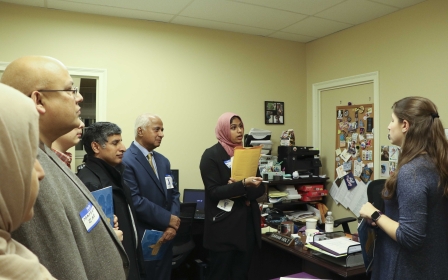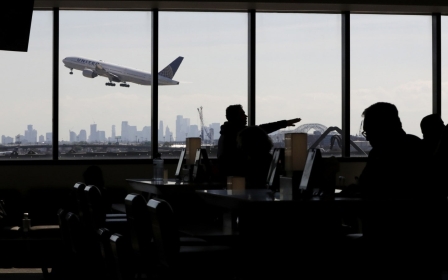US city grants mosques preliminary approval to broadcast call to prayer over loudspeakers

The US city of Paterson, New Jersey, has backed an ordinance to allow the adhan, the Muslim call to prayer, to be broadcast over loudspeakers.
Under the new measure, which still has to go through two public hearings before being implemented, the adhan would be exempt from the city's noise control ordinance and allowed to be broadcast outside every day between 6am and 10pm.
The resolution was approved by council members on Tuesday by a vote of 7-0, with two members abstaining.
"We applaud Paterson officials for taking this admirable step toward inclusion, and encourage them to pass the proposed ordinance," said Salaedin Maksut, executive director of the New Jersey chapter of the Council on American-Islamic Relations (CAIR).
"Their open-mindedness to such laws is a concrete demonstration of respect and mutual understanding between the residents of our rich and diverse communities."
New MEE newsletter: Jerusalem Dispatch
Sign up to get the latest insights and analysis on Israel-Palestine, alongside Turkey Unpacked and other MEE newsletters
'Their open-mindedness to such laws is a concrete demonstration of respect and mutual understanding between the residents of our rich and diverse communities'
- Salaedin Maksut, executive director of CAIR-NJ
Paterson has approximately 30,000 Muslim residents, along with more than 15 mosques scattered across the area.
Maksut compared the sounds made from the Muslim call to prayer to church bells, which are allowed to be broadcast in communities all across the United States.
"The Islamic call to prayer is an integral aspect of a Muslim's five daily prayers," he said.
"Like church bells, it summons worshipers to enter the prayer space, to turn one's body, mind and spirit toward God."
Council members said during the lengthy debate that some mosques in the city currently use outdoor speakers to call Muslims to perform their five daily prayers.
Supporters of the proposal said that the proposed revision would prevent mosques from receiving a noise summons for broadcasting the call.
"We're solving a problem that doesn't exist," Councilman William McKoy said in support of the measure.
In the United States, some cities allow for the adhan to be broadcast, such as in Hamtramck, Michigan, which passed a similar ordinance in 2004.
This article is available in French on Middle East Eye French edition.
Middle East Eye delivers independent and unrivalled coverage and analysis of the Middle East, North Africa and beyond. To learn more about republishing this content and the associated fees, please fill out this form. More about MEE can be found here.




